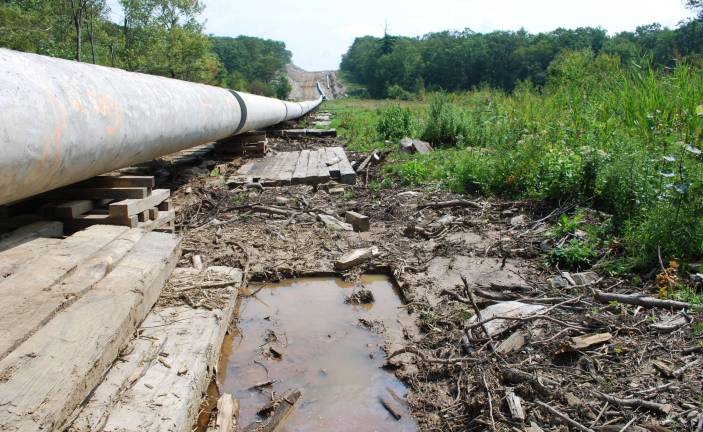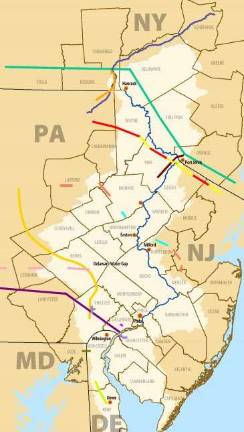With regulations stalled, natural gas booms



SUSSEX COUNTY — Despite years of heated debate from concerned residents over the risks of hydraulic fracturing, the slow pace of state and national regulations has halted locals’ moves to control the gas business.
Skeptics and disciples of the new energy boom await news from many branches and layers of government that have pressed pause on new rules as industry carries on building the foundations of the new natural gas market.
The Environmental Protection Agency, which was ordered by Congress to examine the effects of fracking back in 2009, has yet to conclude its major study. The agency says the report could be out by 2014.
The Delaware River Basin Commission, a multi-state body with delegates from Pennsylvania, New Jersey, New York, Delaware and the federal government, has waited almost three years to vote on rules governing natural gas extraction near the Delaware River.
The New Jersey Sierra Club and other environmental groups are petitioning the commission to further review pipeline projects that enter its jurisdiction along the Delaware.
After a raucous meeting last week, the commissioners did not intervene.
Meanwhile, companies like Chesapeake Energy and the Tennessee Gas Pipeline advance their projects in the gaslands and beyond.
In New Jersey, areas bought up for preservation of open space have been sought out for use by Tennessee Gas and its pipeline projects, New Jersey Sierra Club Director Jeff Tittel said.
Land adjoining the Monksville reservoir in West Milford had been purchased for preservation at a cost of $40,000 per acre in 2009, but, due to regulations for pipeline construction, Tennessee Gas was able to purchase similar parcels for close to one-tenth the price paid by local governments, he said.
The Sierra Club has attempted to appeal state-issued permits granted to the company, only to be overruled.
“We do not have a stay in place, so they’ll clear the trees and then use the fact that they’ve cleared them to further the construction,” Tittel said. “Then when we appeal, they bully us with interstate regulations.”
From wells to pipelines
Despite a moratorium on hydraulic fracturing that remains in place along the Delaware River, the basin region has become a nexus of pipeline construction.
There are 12 pipeline projects currently planned to cross the Delaware River, according to the environmental advocacy group, The Delaware Riverkeeper Network.
Here too, legal holds from the federal level have stopped more localized actions to restrain development.
After Tennessee Gas won permits for water obstruction and encroachment from the Pennsylvania Department of Environmental Protection – despite the objections of the Pike County Conservation District – the Delaware Riverkeeper Network filed an appeal with the state’s Environmental Hearing Board.
The Pike County Conservation District issued 21 notices of violation, including “illegal discharges of sediment” into Savantine Creek, Lords Creek, Shohola Creek, Walker Lake Creek, Twin Lakes Creek, Craft Brook, the Lackawaxen River and several wetlands linked to the pipeline's construction.
Following the appeal, Tennessee Gas filed suit in federal court, saying that, because the pipeline proposed crosses state lines, the Pennsylvania board was interfering in interstate commerce.
The federal judge hearing the case has since issued an injunction, stopping the state’s Environmental Hearing Board from deliberating further.
“Our hands are tied,” said Environmental Hearing Board Secretary Vincent Gustitus.
Jane Davenport, senior attorney for the Delaware Riverkeeper Network said that, without comprehensive planning for natural gas infrastructure, local interests continue to be circumvented in the years spent waiting for rulings from the top.
“Natural gas infrastructure is only getting bigger,” said Davenport. “I’ve got three comment deadlines between now and April 1 for environmental assessments: two on compressor station upgrades and one on a new pipeline project. “
Travis Windle of the Marcellus Shale Coalition said that, although the industry hopes Pennsylvania and the federal government will enact sensible rules for development, the time spent waiting for the rulings has been well-spent. “Without question, there continues to be room for development,” Windle said. “We’ve brought a lot of gas to the market.”
The U.S. Environmental Protection Agency has not yet issued regulations. From the time EPA was first tasked to study hydraulic fracturing, in 2009, the average number of gas rigs in Pennsylvania flourished — from 42 in 2009 to a high of 110 just two years later, according to the industry tracking firm Baker Hughes. So far in 2013, about 73 rigs are operating in the state.
One of the reasons for the decline is the lack of pipeline capacity to move extracted gas to markets like New York City, Windle said.